Unit 2 词汇精讲-【精品课】2023-2024学年七年级英语下册同步精品课件(人教版)
文档属性
| 名称 | Unit 2 词汇精讲-【精品课】2023-2024学年七年级英语下册同步精品课件(人教版) |  | |
| 格式 | pptx | ||
| 文件大小 | 812.4KB | ||
| 资源类型 | 试卷 | ||
| 版本资源 | 人教新目标(Go for it)版 | ||
| 科目 | 英语 | ||
| 更新时间 | 2024-03-05 08:33:15 | ||
图片预览



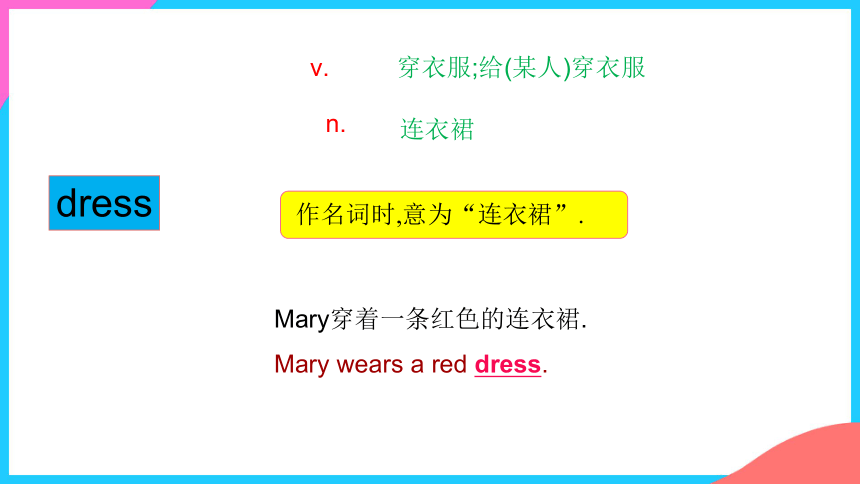
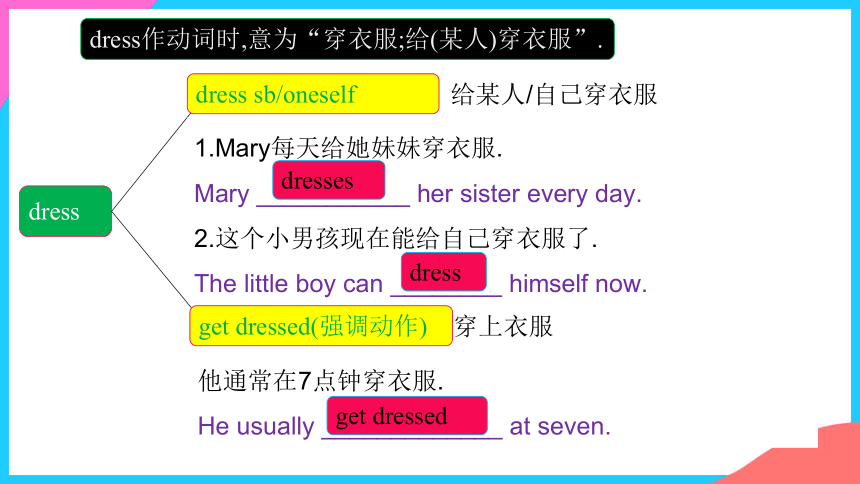
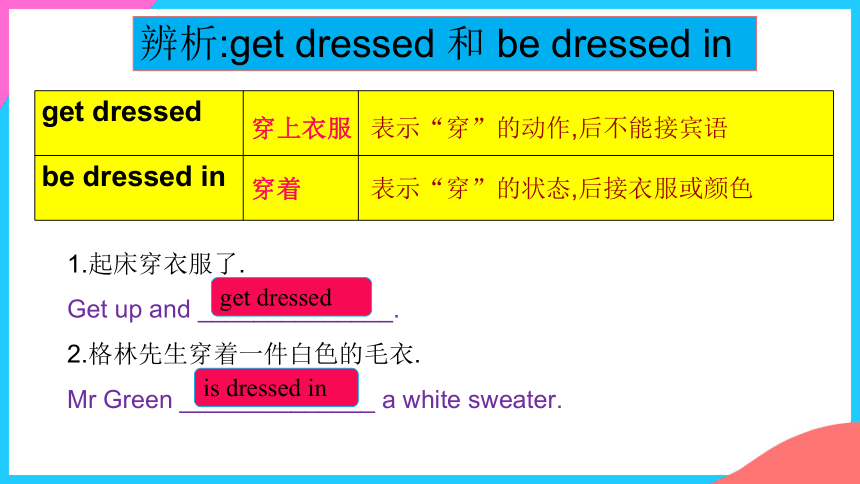
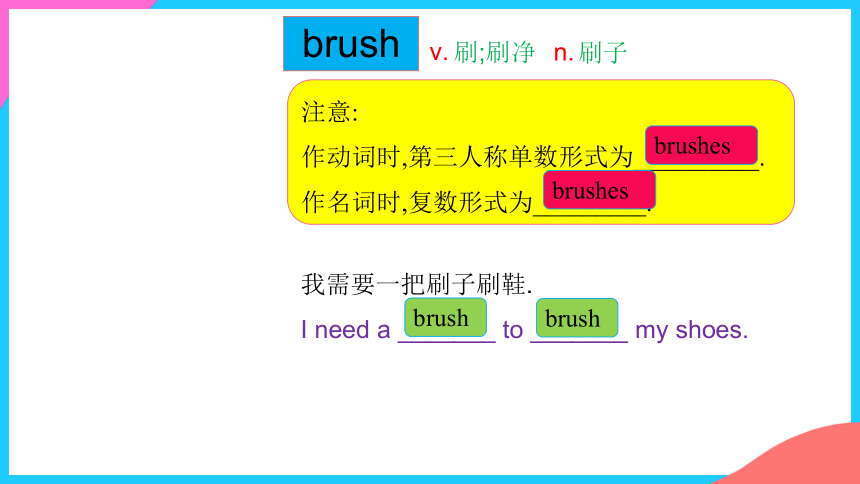

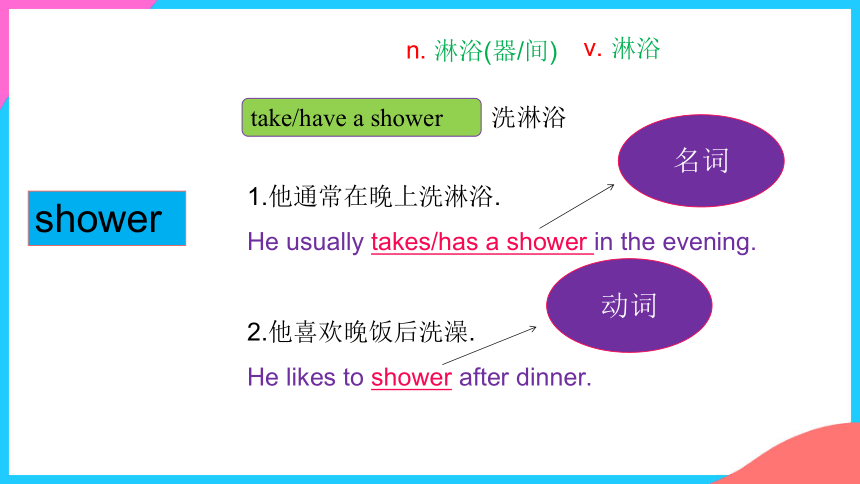



文档简介
(共44张PPT)
核心词汇精讲精练
Unit 2
What time do you go
to school
up
adv.
向上
反义词为down,意为“向下”.
这个女孩向上看了看,看见树上有很多苹果.
The girl looks up and sees many apples on the tree.
get up
起床;站立
反义词为go to bed,意为“上床睡觉”.
Helen通常在六点钟起床.
Helen usually _________at 6:00.
gets up
补充:get up还可意为“起身;站起”.
例如:他起身出去了.
He gets up and goes out.
dress
n.
连衣裙
作名词时,意为“连衣裙”.
v.
穿衣服;给(某人)穿衣服
Mary穿着一条红色的连衣裙.
Mary wears a red dress.
dress作动词时,意为“穿衣服;给(某人)穿衣服”.
dress
dress sb/oneself
给某人/自己穿衣服
get dressed(强调动作)
穿上衣服
1.Mary每天给她妹妹穿衣服.
Mary ___________ her sister every day.
2.这个小男孩现在能给自己穿衣服了.
The little boy can ________ himself now.
他通常在7点钟穿衣服.
He usually _____________ at seven.
dresses
dress
get dressed
辨析:get dressed 和 be dressed in
get dressed
be dressed in
穿上衣服
穿着
表示“穿”的动作,后不能接宾语
表示“穿”的状态,后接衣服或颜色
1.起床穿衣服了.
Get up and ______________.
2.格林先生穿着一件白色的毛衣.
Mr Green ______________ a white sweater.
get dressed
is dressed in
brush
v.
刷;刷净
注意:
作动词时,第三人称单数形式为__________.
作名词时,复数形式为_________.
n.
刷子
brushes
brushes
我需要一把刷子刷鞋.
I need a _______ to _______ my shoes.
brush
brush
tooth
n.
牙齿
注意:复数形式为_______.
类似的还有:foot(脚)-feet
goose(鹅)-geese
teeth
brush (one’s teeth)
牙齿
他每天早上7:00刷牙.
He ________ his _______ at 7:00 every morning.
brushes
teeth
shower
n.
淋浴(器/间)
v.
淋浴
take/have a shower
洗淋浴
1.他通常在晚上洗淋浴.
He usually takes/has a shower in the evening.
2.他喜欢晚饭后洗澡.
He likes to shower after dinner.
名词
动词
Unit 2 What time do you go to school
单词表 (P7)
shower /’ a (r)/ n/v. 淋浴
n. 淋浴器(间)
take a shower 洗淋浴
usually /’ju: u li/
adv. 通常地;一般地
forty /’f :(r)ti/ num. 四十
usually
adv.
通常地;一般地
频度副词,一般位于实义动词之前,联系动词be,助动词或情态动词之后.
我通常六点钟回家.
I usually go home at 6:00.
拓展:频度副词
always
usually
often
sometimes
hardly
never
总是,一直
通常,一般
经常;常常
有时
几乎不
从不;决不
never
adv.
从不;决不
频度副词,一般位于实义动词之前,联系动词be,助动词或情态动词之后.
他从来不吃早饭.
He never eats breakfast.
early
adv/adj.
早(的)
反义词为late“晚(的);迟”
常见短语:
get up early/late
go to bed early/late
1.我每天早上早早的去上学.
I go to school early every morning.(副词)
2.早起的鸟儿有虫吃.
The early bird catches the worm.(形容词)
起床早/晚
睡觉早/晚
job
cn.
工作;职业
我想在上海找一份新工作.
I want to find a new job in Shanghai.
Unit 2 What time do you go to school
单词表 (P8)
station /’ste n/ n. 电(视)台;车站
radio station 广播电台
o’clock / ’kl k/
adv. (表示整点)…点钟
night /na t/ n. 晚上;夜晚
funny /’f ni/
adj. 奇怪的;滑稽好笑的
exercise /’eks sa z/ v/n. 锻炼;练习
work
un/v.
工作
不及物动词, “工作”
worker “工人;工作者”
1.Mary在一所学校工作.
Mary ________ in a school.
2.他是一名工人.
He is a good _________.
2.我每天都有很多的工作要做.
I have much _______ to do every day.
works
worker
work
辨析:work 和 job
work
Job
不可数名词
指人们在日常生活和工作中从事的体力或脑力劳动,即各类工作
可数名词
指具体的职业或工作
1.他每天都有很多工作要做.
He has a lot of _______ to do every day.
2.他有一份有趣的工作.
He has an interesting ______.
work
job
拓展:与work相关的常见短语
at work 在工作
out of work 失业
go to work 去上班
radio station
广播电台
我父亲在广播电台工作.
My father ________ at a radio station.
works
拓展:
TV station 电视台
bus station 公共汽车站
o’clock
adv.
(表示整点)…点钟
只用于整点的后面,多用于口语中,可省略.
他通常下午五点钟到家.
He usually gets home at 5 o’clock in the afternoon.
night
n.
晚上;夜晚
指天完全黑下来直到第二天天亮这一段时间,尤指睡觉之后的夜晚,与之相对的词是day,意为“白天”.
我们白天工作,晚上睡觉.
We work in the day and sleep __________.
at night
在夜晚;在夜里
at night
funny
adj.
奇怪的;滑稽好笑的
常作表语或定语.名词形式我fun(乐趣;快乐)
1.这个故事很有趣。
The story is very funny.
2.他是滑稽的人.
He is a funny man.
作表语
作定语
exercise
v/n.
锻炼;练习
exercise
vi.锻炼
un.(身体或脑力)锻炼;运动
常和take , do , get连用
cn.练习;习题;一套动作
我通常每天锻炼一个小时.
I usually exercise for an hour every day.
exercise
vi.锻炼
un.(身体或脑力)锻炼;运动
常和take , do , get连用
cn.练习;习题;一套动作
如果你不做运动,你会变胖.
If you don’t do exercise, you will be fat.
做早操对我们的健康有好处.
Doing morning exercises is good for our health.
Unit 2 What time do you go to school
单词表 (P9)
on weekends (在)周末
best /best/ adj. 最好的
adv. 最好地;最
group /gru:p/ n. 组;群
on weekends
(在)周末
也可用at weekends,常用于一般现在时.
你周末通常做什么
What do you usually do on/at weekends
best
adj.
最好的
adv.
最好地;最
best
adj. 是good 的最高级形式
adv. 是well 的最高级形式
他是我最好的朋友.
He is my best friend.
我最喜欢英语.
I like English best.
group
n.
组;群
a group of…
一组…;一群…(of后接可数名词复数)
一群女孩正在唱歌.
A group of girls are singing.
注意:group是集合名词,作主语时,若作为一个整体看待,谓语动词用单数;若强调其中的成员,谓语动词用复数.
1.这个小组的人正在打算房间.
The group ________(be) cleaning the room.
2.我的组有一些很棒的运动员.
My group ________(have) some good players.
is
has
half
n/pron.
一半;半数
其复数形式为halves.
half past+整点时间
几点半
half of …
一半…
in half
分成两半
1.现在六点半.
2.十的一半是五.
3.请把这个苹果切成两半.
It’s ____________ now.
_________ ten is five.
Please cut the apple _________.
half past six
Half of
in half
past
prep.
晚于;过(时间)
adj.
过去的
past
prep.(在时间上)晚于;过(时间)
现在八点二十.
It’s twenty past eight.
adj.过去的
在过去的岁月里
in the past years
Destiny工作室出品
13540016960
quarter
n.
一刻钟;四分之一
1.我通常6:15 起床.
I usually get up at a quarter past six.
2.请等我一刻钟.
Please wait for a quarter.
3.我把这个苹果切成四份.
I cut the apple into four quarters.
homework
un.
家庭作业
do (one’s) homework
one’s指形容词性物主代词.
不可数名词,不能用many修饰,但可用much, a lot of等修饰.
1.我每天都做作业.
I ________________ every day.
2.我有很多作业.
I have ________________.
do my homework
much homework
run
v.
跑;奔
过去式:ran
现在分词:running名词形式:runner
我擅长跑步,我每天都跑步.在我们学校我是一名优秀的跑步运动员.
I am good at _________ and I ______ every day. I am a good ________ in our school.
running
run
runner
clean
v.
打扫;弄干净
adj.
干净的
clean
vt. 打扫;弄干净
Ann经常打扫她的房间.
Ann often ________ her room.
adj. 干净的(同义词:tidy; 反义词:dirty)
我们应该保持教室干净整洁.
We should keep our classroom clean and tidy.
clean up 打扫干净
cleans
walk
v/n
行走;步行
take a walk
have a walk
go for a walk
散步;走一走
take sb for a walk
带某人去散步
我们晚饭后去散步吧.
Let’s take a walk after dinner.
quickly
adv.
很快地
quick
adj.
快的
我快速地吃完早餐.
I have breakfast _________.
= I have a _______ breakfast.
quickly
quick
副词修饰动词时,常置于动词之后.
quickly
either
conj.
或者
adv.
也(用在否定句末)
either用作连词时,意为“或者”.
常见结构:
either…or… 要么…要么…;或者…或者...
表示选择,用于两并列的成分.
Destiny工作室出品
13540016960
1.他要么在教室,要么在家.
He is _______ in the classroom ____ at home.
2. 当她高兴时,不是唱歌就是跳舞.
When she is happy, she _______ sings ____ dances.
either
or
either
or
注意:当either…or…连接并列主语时,谓语动词应与最近的一个主语在人称和数上保持一致.
就近原则
要么你要么我在家.
Either you or I _____ at home.
am
either的其他两种词性
adv. “也;而且”,常用于否定句末,前通常有逗号
pron. “(两者之中)任选其一”
我也不会打篮球.
I can’t play basketball, either.
这两本书,你可以任选一本.
You can take either of the two books.
either
lots of
大量;许多
lots of
a lot of
大量;许多
后加可数名词,不可数名词均可.
修饰可数名词时,相当于many;
修饰不可数名词时,相当于much
树上有许多苹果.
There are __________________ apples on the tree.
many/a lot of/lots of
sometimes
adv.
有时
sometimes为频度副词,相当于at times
有时我起床很晚.
Sometimes I get up late.
拓展:频度副词
always
usually
often
sometimes
hardly
never
总是,一直
通常,一般
经常;常常
有时
几乎不
从不;决不
taste
v.
有…的味道;品尝
n.
味道;滋味
①连系动词. “有…的味道”
②实义动词. “品尝;尝”
名词. “味道,滋味”
taste
①连系动词. “有…的味道”
②实义动词. “品尝;尝”
名词. “味道,滋味”
taste like…尝起来像…
这个苹果尝起来是甜的.
这饮料尝起来像橘子汁.
后跟形容词作表语.
The apple tastes sweet.
The drink tastes like orange juice.
你能品尝一下它吗
Can you taste it
这个橘子有甜味.
The orange has a sweet taste.
taste
life
n.
生活;生命(复数:lives)
①生活
②生命
live a/an…life
我们过着幸福的生活.
We live a happy life.
过着…的生活
in one’s life
all one’s life
这个人救了那个男孩的命.
The man saves the boy’s life.
在某人的一生中
life
某人的一生
核心词汇精讲精练
Unit 2
What time do you go
to school
up
adv.
向上
反义词为down,意为“向下”.
这个女孩向上看了看,看见树上有很多苹果.
The girl looks up and sees many apples on the tree.
get up
起床;站立
反义词为go to bed,意为“上床睡觉”.
Helen通常在六点钟起床.
Helen usually _________at 6:00.
gets up
补充:get up还可意为“起身;站起”.
例如:他起身出去了.
He gets up and goes out.
dress
n.
连衣裙
作名词时,意为“连衣裙”.
v.
穿衣服;给(某人)穿衣服
Mary穿着一条红色的连衣裙.
Mary wears a red dress.
dress作动词时,意为“穿衣服;给(某人)穿衣服”.
dress
dress sb/oneself
给某人/自己穿衣服
get dressed(强调动作)
穿上衣服
1.Mary每天给她妹妹穿衣服.
Mary ___________ her sister every day.
2.这个小男孩现在能给自己穿衣服了.
The little boy can ________ himself now.
他通常在7点钟穿衣服.
He usually _____________ at seven.
dresses
dress
get dressed
辨析:get dressed 和 be dressed in
get dressed
be dressed in
穿上衣服
穿着
表示“穿”的动作,后不能接宾语
表示“穿”的状态,后接衣服或颜色
1.起床穿衣服了.
Get up and ______________.
2.格林先生穿着一件白色的毛衣.
Mr Green ______________ a white sweater.
get dressed
is dressed in
brush
v.
刷;刷净
注意:
作动词时,第三人称单数形式为__________.
作名词时,复数形式为_________.
n.
刷子
brushes
brushes
我需要一把刷子刷鞋.
I need a _______ to _______ my shoes.
brush
brush
tooth
n.
牙齿
注意:复数形式为_______.
类似的还有:foot(脚)-feet
goose(鹅)-geese
teeth
brush (one’s teeth)
牙齿
他每天早上7:00刷牙.
He ________ his _______ at 7:00 every morning.
brushes
teeth
shower
n.
淋浴(器/间)
v.
淋浴
take/have a shower
洗淋浴
1.他通常在晚上洗淋浴.
He usually takes/has a shower in the evening.
2.他喜欢晚饭后洗澡.
He likes to shower after dinner.
名词
动词
Unit 2 What time do you go to school
单词表 (P7)
shower /’ a (r)/ n/v. 淋浴
n. 淋浴器(间)
take a shower 洗淋浴
usually /’ju: u li/
adv. 通常地;一般地
forty /’f :(r)ti/ num. 四十
usually
adv.
通常地;一般地
频度副词,一般位于实义动词之前,联系动词be,助动词或情态动词之后.
我通常六点钟回家.
I usually go home at 6:00.
拓展:频度副词
always
usually
often
sometimes
hardly
never
总是,一直
通常,一般
经常;常常
有时
几乎不
从不;决不
never
adv.
从不;决不
频度副词,一般位于实义动词之前,联系动词be,助动词或情态动词之后.
他从来不吃早饭.
He never eats breakfast.
early
adv/adj.
早(的)
反义词为late“晚(的);迟”
常见短语:
get up early/late
go to bed early/late
1.我每天早上早早的去上学.
I go to school early every morning.(副词)
2.早起的鸟儿有虫吃.
The early bird catches the worm.(形容词)
起床早/晚
睡觉早/晚
job
cn.
工作;职业
我想在上海找一份新工作.
I want to find a new job in Shanghai.
Unit 2 What time do you go to school
单词表 (P8)
station /’ste n/ n. 电(视)台;车站
radio station 广播电台
o’clock / ’kl k/
adv. (表示整点)…点钟
night /na t/ n. 晚上;夜晚
funny /’f ni/
adj. 奇怪的;滑稽好笑的
exercise /’eks sa z/ v/n. 锻炼;练习
work
un/v.
工作
不及物动词, “工作”
worker “工人;工作者”
1.Mary在一所学校工作.
Mary ________ in a school.
2.他是一名工人.
He is a good _________.
2.我每天都有很多的工作要做.
I have much _______ to do every day.
works
worker
work
辨析:work 和 job
work
Job
不可数名词
指人们在日常生活和工作中从事的体力或脑力劳动,即各类工作
可数名词
指具体的职业或工作
1.他每天都有很多工作要做.
He has a lot of _______ to do every day.
2.他有一份有趣的工作.
He has an interesting ______.
work
job
拓展:与work相关的常见短语
at work 在工作
out of work 失业
go to work 去上班
radio station
广播电台
我父亲在广播电台工作.
My father ________ at a radio station.
works
拓展:
TV station 电视台
bus station 公共汽车站
o’clock
adv.
(表示整点)…点钟
只用于整点的后面,多用于口语中,可省略.
他通常下午五点钟到家.
He usually gets home at 5 o’clock in the afternoon.
night
n.
晚上;夜晚
指天完全黑下来直到第二天天亮这一段时间,尤指睡觉之后的夜晚,与之相对的词是day,意为“白天”.
我们白天工作,晚上睡觉.
We work in the day and sleep __________.
at night
在夜晚;在夜里
at night
funny
adj.
奇怪的;滑稽好笑的
常作表语或定语.名词形式我fun(乐趣;快乐)
1.这个故事很有趣。
The story is very funny.
2.他是滑稽的人.
He is a funny man.
作表语
作定语
exercise
v/n.
锻炼;练习
exercise
vi.锻炼
un.(身体或脑力)锻炼;运动
常和take , do , get连用
cn.练习;习题;一套动作
我通常每天锻炼一个小时.
I usually exercise for an hour every day.
exercise
vi.锻炼
un.(身体或脑力)锻炼;运动
常和take , do , get连用
cn.练习;习题;一套动作
如果你不做运动,你会变胖.
If you don’t do exercise, you will be fat.
做早操对我们的健康有好处.
Doing morning exercises is good for our health.
Unit 2 What time do you go to school
单词表 (P9)
on weekends (在)周末
best /best/ adj. 最好的
adv. 最好地;最
group /gru:p/ n. 组;群
on weekends
(在)周末
也可用at weekends,常用于一般现在时.
你周末通常做什么
What do you usually do on/at weekends
best
adj.
最好的
adv.
最好地;最
best
adj. 是good 的最高级形式
adv. 是well 的最高级形式
他是我最好的朋友.
He is my best friend.
我最喜欢英语.
I like English best.
group
n.
组;群
a group of…
一组…;一群…(of后接可数名词复数)
一群女孩正在唱歌.
A group of girls are singing.
注意:group是集合名词,作主语时,若作为一个整体看待,谓语动词用单数;若强调其中的成员,谓语动词用复数.
1.这个小组的人正在打算房间.
The group ________(be) cleaning the room.
2.我的组有一些很棒的运动员.
My group ________(have) some good players.
is
has
half
n/pron.
一半;半数
其复数形式为halves.
half past+整点时间
几点半
half of …
一半…
in half
分成两半
1.现在六点半.
2.十的一半是五.
3.请把这个苹果切成两半.
It’s ____________ now.
_________ ten is five.
Please cut the apple _________.
half past six
Half of
in half
past
prep.
晚于;过(时间)
adj.
过去的
past
prep.(在时间上)晚于;过(时间)
现在八点二十.
It’s twenty past eight.
adj.过去的
在过去的岁月里
in the past years
Destiny工作室出品
13540016960
quarter
n.
一刻钟;四分之一
1.我通常6:15 起床.
I usually get up at a quarter past six.
2.请等我一刻钟.
Please wait for a quarter.
3.我把这个苹果切成四份.
I cut the apple into four quarters.
homework
un.
家庭作业
do (one’s) homework
one’s指形容词性物主代词.
不可数名词,不能用many修饰,但可用much, a lot of等修饰.
1.我每天都做作业.
I ________________ every day.
2.我有很多作业.
I have ________________.
do my homework
much homework
run
v.
跑;奔
过去式:ran
现在分词:running名词形式:runner
我擅长跑步,我每天都跑步.在我们学校我是一名优秀的跑步运动员.
I am good at _________ and I ______ every day. I am a good ________ in our school.
running
run
runner
clean
v.
打扫;弄干净
adj.
干净的
clean
vt. 打扫;弄干净
Ann经常打扫她的房间.
Ann often ________ her room.
adj. 干净的(同义词:tidy; 反义词:dirty)
我们应该保持教室干净整洁.
We should keep our classroom clean and tidy.
clean up 打扫干净
cleans
walk
v/n
行走;步行
take a walk
have a walk
go for a walk
散步;走一走
take sb for a walk
带某人去散步
我们晚饭后去散步吧.
Let’s take a walk after dinner.
quickly
adv.
很快地
quick
adj.
快的
我快速地吃完早餐.
I have breakfast _________.
= I have a _______ breakfast.
quickly
quick
副词修饰动词时,常置于动词之后.
quickly
either
conj.
或者
adv.
也(用在否定句末)
either用作连词时,意为“或者”.
常见结构:
either…or… 要么…要么…;或者…或者...
表示选择,用于两并列的成分.
Destiny工作室出品
13540016960
1.他要么在教室,要么在家.
He is _______ in the classroom ____ at home.
2. 当她高兴时,不是唱歌就是跳舞.
When she is happy, she _______ sings ____ dances.
either
or
either
or
注意:当either…or…连接并列主语时,谓语动词应与最近的一个主语在人称和数上保持一致.
就近原则
要么你要么我在家.
Either you or I _____ at home.
am
either的其他两种词性
adv. “也;而且”,常用于否定句末,前通常有逗号
pron. “(两者之中)任选其一”
我也不会打篮球.
I can’t play basketball, either.
这两本书,你可以任选一本.
You can take either of the two books.
either
lots of
大量;许多
lots of
a lot of
大量;许多
后加可数名词,不可数名词均可.
修饰可数名词时,相当于many;
修饰不可数名词时,相当于much
树上有许多苹果.
There are __________________ apples on the tree.
many/a lot of/lots of
sometimes
adv.
有时
sometimes为频度副词,相当于at times
有时我起床很晚.
Sometimes I get up late.
拓展:频度副词
always
usually
often
sometimes
hardly
never
总是,一直
通常,一般
经常;常常
有时
几乎不
从不;决不
taste
v.
有…的味道;品尝
n.
味道;滋味
①连系动词. “有…的味道”
②实义动词. “品尝;尝”
名词. “味道,滋味”
taste
①连系动词. “有…的味道”
②实义动词. “品尝;尝”
名词. “味道,滋味”
taste like…尝起来像…
这个苹果尝起来是甜的.
这饮料尝起来像橘子汁.
后跟形容词作表语.
The apple tastes sweet.
The drink tastes like orange juice.
你能品尝一下它吗
Can you taste it
这个橘子有甜味.
The orange has a sweet taste.
taste
life
n.
生活;生命(复数:lives)
①生活
②生命
live a/an…life
我们过着幸福的生活.
We live a happy life.
过着…的生活
in one’s life
all one’s life
这个人救了那个男孩的命.
The man saves the boy’s life.
在某人的一生中
life
某人的一生
